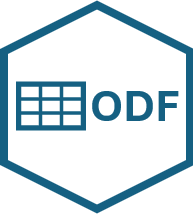 R
Package
R
Package
R-Package opendataformat
The opendataformat package is published on CRAN.
The package is specifically designed to facilitate the seamless
utilization of the Open Data Format in R. It offers functionality to
import data from the Open Data Format into an R data frame, as well as
export data from an R data frame to the Open Data Format. Additionally,
you can easily access comprehensive information about the dataset and
variables using either the RStudio Viewer or your web browser. This
user-friendly approach ensures convenient exploration and utilization of
dataset information within your preferred environment.
For more comprehensive insights into the Open Data Format specification, look at the Specification. This resource provides detailed documentation and profiles illustrating the storage locations of attributes within the Open Data Format, as well as within the native formats to which they will be converted.
Additionally, you can download a practical example of a data file in the Open Data Format (example_dataset.zip).
Learn more about the Open Data Format in R in
vignette("opendataformat").
Installation
The R package can be installed from CRAN
install.packages("opendataformat")Getting Started
The opendataformat package consists of six main
functions:
read_odf()to read an Open Data Format file in R. This function takes an input parameter, which is the path to the Open Data Format ZIP file, and points to an R object for further processing.docu_odf()to explore the dataset information. You can set the whole datasetdfor an selected variabledf$varas input and you will get an HTML page, displayed either in the RStudio viewer or the Web Browser, with metadata on the respective data level.setlanguage_odf()changes the “active” language of a dataset. The metadata for this language is by default displayed withdocu_odf().write_odf()to write the R Dataframe to an Open Data Format ZIP file. By specifying the dataframe input and providing the output directory path the function will generate a ZIP file containing the dataset as “data.csv” and “metadata.xml”.odf_labels()to retrieve labels and other metadata from an odf-data.frame-object.as_odf_tbl()to convert a data frame object (object of class data.frame or any subclass) to an ODF tibble (odf_tbl class).
For more information on the R package functions check the Package Vignette from CRAN.
Multilingual Datasets
When working with a multilingual dataset, the
opendataformatr package provides the option to specify the
language you want to work with for the main functions:
read_odf(), docu_odf(),
write_odf(), and odf_labels().
You can achieve this by using the languages argument and
setting it to either all to include all languages,
current (or default) to use the currently
activated language, or by specifying the language code such as
de for German or en for English. This allows
you to easily select the desired language for your dataset operations.
The language codes are defined by the ISO
639-1. Note that for the function odf_labels() you can
specify only one language, therefore the language argument
only takes single languages as input.